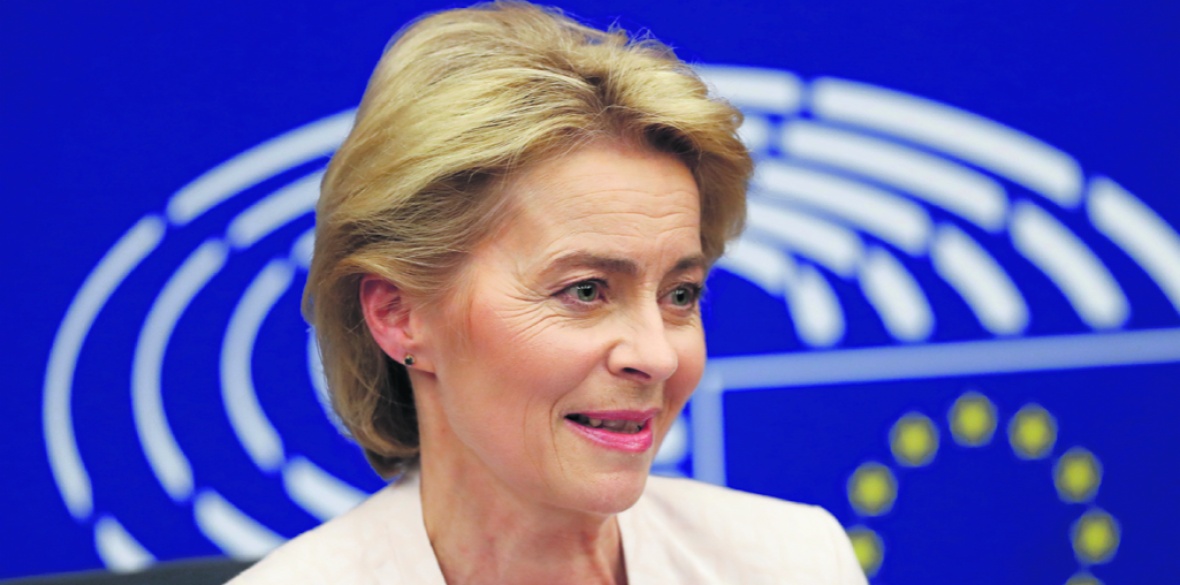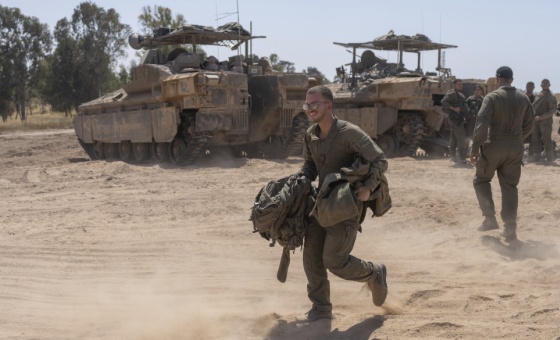This is the last article you can read this month
You can read more article this month
You can read more articles this month
Sorry your limit is up for this month
Reset on:
Please help support the Morning Star by subscribing here
WHILE Donald Trump dominates the news daily in the US with his racist diatribes, tweets, and rallies, the public can’t be blamed if it fails to notice that the right is pushing for a level of militarisation and war planning that goes beyond much of what we have seen before.
Nato, with the backing of Germany, Britain and the US, is quietly arming to the teeth dangerous governments in Europe and Africa and readying itself for military strikes in the Middle East and against Russia.
On a regular basis, thousands are camping out in protest against these plans at the Ramstein military base in south-west Germany, the largest US military base outside the US. Peace activists from around the world have also descended upon another location in Germany where the US has readied 20 nuclear missiles for use at any moment.
Recent developments put Germany squarely in the camp of Nato’s war hawks with Ursula von der Leyen’s narrow election to the chairmanship of the European Commission, the 28-member “cabinet” of the European Union.
Despite having cultivated the reputation internationally as a “reasonable” leader, German Chancellor Angela Merkel has been pushing for the elevation of von der Leyen, an extreme militarist, to that post.
As the German Defence Minister for the last five years, von der Leyen has led the biggest military expansion of Germany in three decades. While the racist and fascist forces in Germany use the Alternative for Germany party (AfD) to push their agenda, the military-industrial complex has been able to accomplish much of its agenda through the mainstream Christian Democratic Union party.
Von der Leyen had campaigned in support of European Commission plans, announced in March, to strengthen and widen highways and rail lines that run west to east across Germany so that troops and tanks “can move quickly eastward from German bases and ports.” Von der Leyen has strongly advocated support for an EU military wing in addition to Nato and is now in the position to oversee its development.
Meanwhile, Nato has already integrated into its operation a group of German officers who command what it calls a “high readiness task force” that, according to the US general in command at Ramstein, Mark August, “can be sent anywhere in three days.”
If her actions prior to her election this week are any indication, she has been scouting out potential sites to host massive increases in German armaments. She recently visited German troops in Lithuania and elsewhere near the Russian border.
When Soviet troops pulled out of one country after another in eastern Europe in 1990, no time was wasted in replacing them with US and German troops, under the umbrella of Nato, of course.
Nato didn’t stop after rolling the tanks into just the countries from which the Soviets withdrew, however. They pushed far into territory that had been part of the Soviet Union itself. That territory included the Baltic states of Lithuania, Latvia, and Estonia, all former republics of the USSR.
The expansion of Nato into all of these areas violated promises the US made to the Soviet Union that such expansion would never take place and increased the danger of nuclear war between the world’s two biggest nuclear powers, who now maintain military hardware virtually within sight of one another.
That level of potential conflict has not happened since US and Soviet tanks faced one another head on only a few feet apart on the streets of Berlin in the early 1960s. It took the construction of the Berlin Wall to defuse that confrontation, which also had the potential to turn into nuclear war.
In Latvia, US troops have participated in war games near the Russian border for more than three years now. An activist in the opposition Socialist Party in that country, whose name is withheld because of certain government reprisal, described for People’s World the morning when these manoeuvres began and how people in a small Latvian town woke up to the unannounced arrival of US tanks and jeeps. Armed soldiers fanned out across their village and took up positions in front of homes and on street corners.
Peace forces note that giving military aid to a dangerous right-wing government like the Latvian government, which is repressing political opposition and making it illegal for anyone to even speak or write positively about anything that happened in the Soviet era, is hardly conducive to strengthening peace and security on the European continent.
While in Lithuania, von der Leyen promised that, in addition to German troops, she would send the Lithuanians €110 million to modernise its military. Lithuania, also under the control of right-wing extremists, now officially celebrates the memory of Lithuanian “heroes” who were members of Hitler’s SS and organised the slaughtering of Jews in the country during World War II.
“We will stay as long as the security question requires,” she said in Lithuania. “We are the only European continental country to maintain a forward position in the Baltic area. And,” she bragged, “we are the country with the second-largest number of troops in Afghanistan.”
General August bragged recently that “when you see all the planes lined up here [at Ramstein], you see that this is the place that gets things moving in the direction of Africa, the Middle East, and eastern Europe,” with the obvious targets he has in mind including Russia and Iran.
As he said, “things” have been moving out of Ramstein for quite a while. It is from there that drones are dispatched to kill individuals in locations in Africa and the Middle East, including Iran, without regard to whether the operations violate international borders.
Farmers, civilians, wedding parties, school buses full of children, and so much more have been blasted off the face of the earth by weapons launched from Ramstein.
Near Ramstein is an air force base at Buechel storing 20 ready-to-go B61 nuclear bombs, each with 20 to 30 times the destructive power of the bomb dropped on Hiroshima. And German Tornado planes, equipped to carry and dispatch these missiles, are lined up at the base.
August and other generals are bragging, however, that soon these planes won’t be needed because they will be able to launch the nuclear missiles direct from their silos in Ramstein to their targets.
The resistance continues, however. This week, international peace activists from Germany, the Netherlands, Britain and the US entered the Buechel Air Base to deliver what they called a Treaty Enforcement Order that said the presence of US nuclear weapons there is “a criminal conspiracy to commit war crimes.”
Upon entering the main gate with a “cease and desist order,” they demanded to see the base commander to deliver the order in person.
“We refuse to be complacent in this crime,” said Brian Terell of Voices for Creative Non-Violence in Chicago, Illinois. “We call for the nuclear weapons to be returned to the US immediately.”
All 11 activists were detained but released after producing identification.
The local German group Non-violent Action for the Abolition of Nuclear Weapons has convened an “international action week” demanding the permanent removal of all US nuclear weapons.
“This is crime prevention,” says John LaForge of Nukewatch, a US peace group, when asked the purpose of the entry into the Ramstein base. LaForge is the leader of the US delegation to the international action week.
“The plans for training personnel in the eventual use of these bombs is illegal because organising mass destruction was banned at the Nuremberg trials,” says Susan ven der Hijden, an activist from Amsterdam who is part of the delegation. Before coming to Germany, she had joined protests in Kansas City against the new nukes being manufactured there.
Some sections of the major media here go along with the war planning and carry stories alleging Russian “aggression” that they say necessitates the mobilisation. Most Germans, polls show, are for peace, however, and reject the idea that Russia is about to invade or start a war.
And nowhere is the situation in the media as bad as it is in the United States, where liberal media often lead the crusade against Russia. The result has been that many in the US see Russia as the main threat to democracy when, of course, the biggest threats, including racism, attacks on unions, and the right to vote, are fully home-grown.
On Iran, more people here in Germany seem to recognise that it is the US and not Iran that broke the nuclear deal.
There is huge public sentiment in Germany for peace, which is a counterbalance to the influence of the war hawks — both the home-grown ones and the ones imported from the US. Few Germans, as well as many Europeans, have forgotten the horrific effects of war.
On the domestic political front, the Christian Democratic Union, the single party with the largest vote in Germany, supports militarising the country. The Social Democrats go along with or oppose them depending upon which wing of the party is involved.
The Greens, which recently seem to be replacing the Social Democrats as the second party, do not, unfortunately, play a major role in the peace movement.
The obvious connection between saving the environment and cutting the military hasn’t become a part of their rallying cry. Overall the party is far less radical than when it was founded 30 years ago. There are some state branches, however, where they take better positions, particularly when they enter coalitions with Die Linke, the Left Party.
Die Linke is the only major party, however, that consistently opposes any military spending and consistently opposes the placement of any German troops outside the borders of Germany.
This is an edited version of an article that appeared on People’s World.











